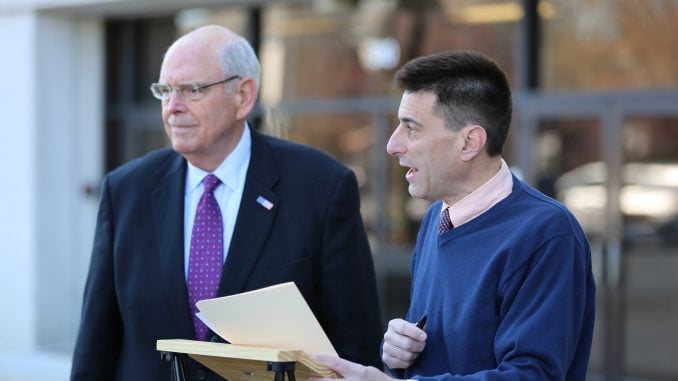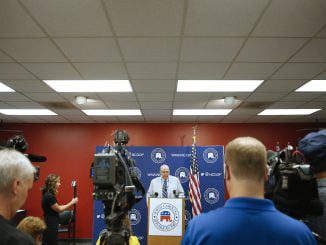
RALEIGH – The chairman of the N.C. Republican Party, Robin Hayes, and its executive director, Dallas Woodhouse, filed a request Tuesday in federal court calling for an investigation of the agreement between the Atlantic Coast Pipeline, LLC and N.C. Governor Roy Cooper that provides a $57.8 million fund the governor’s office says was for environmental mitigation and economic development in the areas impacted by the pipeline’s construction. The fund was announced the day before final permits were issued by the Department of Environmental Quality that allowed the interstate project to move forward. DEQ has said that there was no coordination between the issuance of the permits and the agreement over the fund.
“Calling for a federal investigation of a sitting governor is a serious matter and not taken lightly. However, the conduct of Governor Cooper regarding the $58 million pipeline fund designed to be under his sole control appears to be that worst example of pay to play politics intended to benefit him personally and/or politically,” said Woodhouse.
“A serious look by federal investigators is warranted,” he added.
The fund has been controversial as lawmakers in the N.C. General Assembly question how the agreement came about and whether the governor asked for the money in exchange for the permits and why the money bypassed the statutory state budgeting process. Money coming into the state generally is managed and budgeted by the elected N.C. General Assembly. In addition, money for environmental mitigation was already built into the contract with the owners of the pipeline.
“Did the governor in some way threaten to extort, implied or direct – it doesn’t have to be a direct call for extortion – but somehow make those power companies believe… that the permits would not be issued should this fund not be established,” said Woodhouse. “If the power companies are entitled to the permits, they are entitled to the permits. That is the law. It is a horrific precedent to think that any private business, or private citizens could be denied permits and government rights…by somebody in this fashion.”
The request was filed in a letter to the office of the U.S. Attorney for N.C.’s Eastern District and sent by courier to U.S. Attorney General Jeff Sessions. It says that the process around securing funds raises red flags that it may have violated the federal Hobbs Act. The Act essentially codified “pay to play” making it illegal to limit the interstate flow of goods and services for money, calling it “actual or attempted robbery or extortion” by public officials. Since the Hobbs Act became law, eight governors have been convicted of violating it.
“It’s certainly the type of thing, if I were still a federal prosecutor, that I would want to take a look at. It doesn’t pass the smell test at a minimum,” said former federal prosecutor and Raleigh attorney, Kieran Shanahan.
“From public reports there is more than enough reason that a federal prosecutor would want to look at it,” he added.
The mitigation fund was presented to the state by Cooper’s office in February as money to boost economic development and environmental repairs in the eight counties where the Atlantic Coast Pipeline will pass, on its way from West Virginia and Virginia. Those counties are North Hampton, Halifax, Nash, Wilson, Johnston, Sampson, Cumberland and Robeson counties. Cooper is from Nash County.
However, as the agreement is written and signed by Cooper’s lawyer, William McKinney, the $57.8 million would be distributed by as-of-yet unnamed board members appointed by the governor. Republican lawmakers called it a “slush fund” for Cooper to dole out to projects supported by his political base.
“The governor’s party has a number of different constituencies, just like we do,” said Hayes. “There are people who are very much opposed to this pipeline. Governor Cooper felt the heat, he saw the light. Then he, very disappointingly, came up with this slush fund and the trail leads directly to ‘I need to do something to satisfy my base.’ The trail becomes clear and now it’s up to us to follow it to its logical conclusion.”
The governor’s office criticized lawmakers’ inquiries, saying that they were putting the money for poor areas of eastern N.C. in jeopardy. The project is expected to provide $48 million in labor income and more than $80 million in additional economic activity annually.
“It definitely sends a very negative message to businesses potentially looking at North Carolina .… that you are going to have to pay to play if you want to get permits that, if you meet the requirements, you might otherwise be eligible for.” – Robin Hayes, chairman of the N.C. GOP
Cooper’s office pointed out that Virginia also has a mitigation fund agreement with ACP owners Dominion Energy and Duke Energy for a similar amount, but in that case the Virginia Department of Natural Resources administers the fund through non-profit mitigation partners.
In an interview earlier this month, Cooper’s chief strategist, Ken Eudy, told Triangle television station WRAL that the mitigation fund agreement was an effort to bypass the legislative budgeting process, and the state treasury, because of the trust breakdown between the N.C. executive branch and the legislature.
The General Assembly appears not to trust Cooper either. In February, the legislature passed H.B. 90, which phased in last year’s class size mandate, but also sends the entire $57.8 million-dollar mitigation fund to the school systems in the eight counties impacted.
The call for an investigation from Republicans comes as Cooper also faces a challenge to some of the permits issued for the pipeline. The petition against Cooper’s Department of Environmental Quality alleges that the four permits issued by the state for the Atlantic Coast Pipeline “did not meet proper procedures,” “acted arbitrarily” and “failed to act as required by law or rule.”
It was filed by Francis DeLuca, former head of the conservative Civitas Institute, and contests permits and approvals, including an air quality permit that he says results in harm to air quality.




